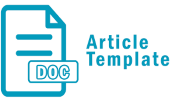Politics of the Law of Covid-19 Handling by The Indonesian Government from Health Human Rights Perspective
Abstract
COVID-19 is a disease that was first discovered in China where it spreads very quickly until it was recorded that until January 28, 2021, 1 million Indonesians were exposed to the virus with the highest number of cases in Southeast Asia. Every citizen has the right to be given protection by the government from this case. The right to health is a derivative of human rights that must be protected. In dealing with the COVID-19 pandemic, the government has implemented various legal rules, including government regulations implementing Law Number 1 of 2020, State Finance and Financial System Stability policies during the 2019 Coronavirus Pandemic (COVID-19) and government regulations number 21 of 2020. 2020 is the date of Mass Social Restrictions in the Context of Acceleration (PSBB) for Handling Corona Virus Disease 2019 (Covid-19). The government has also implemented PSBB and Physical Distancing policies, but these policies have not been effective in breaking the chain of transmission of COVID-19. The method used in this study is a descriptive normative juridical research method by providing solutions for handling COVID-19 in Indonesia. This study concludes that the legal politics (PSBB and physical distancing) achieved by the government in handling COVID-19 are not in accordance with Article 28 H paragraphs (1) and 34 of the 1945 Constitution paragraphs (2) and (3).
Keywords
Full Text:
PDFReferences
Adiyanta, F. S. (2020). Fleksibilitas pajak sebagai instrumen kebijaksanaan fiskal untuk mengantisipasi krisis ekonomi sebagai akibat dampak pandemi covid-19. Administrative Law and Governance Journal, 3(1), 162-181.
Affandi, H. (2019). Implementasi hak atas kesehatan menurut undang-undang dasar 1945: antara pengaturan dan realisasi tanggung jawab negara. Jurnal Hukum Positum, 4(1), 36–56.
Amin, M., Arly, I., dan Adjie, H. (2021). Tanggung jawab rumah sakit terhadap tenaga medis yang terpapar corona virus disease (covid-19). Perspektif, 26(2), 98-109.
Arsil, F., dan Ayuni, Q. (2020). Model pengaturan kedaruratan dan pilihan kedaruratan Indonesia dalam menghadapi pandemi covid-19. Jurnal Hukum & Pembangunan, 50(2), 423-446.
Grad, F. P. (2002). The preamble of the constitution of the world health organization. Bulletin of the World Health Organization, 80, 981-981.
Hamzah, A. S. (2016). Pengaturan perlindungan hukum bagi tenaga kerja wanita beserta keluarganya berdasarkan uu no. 6 tahun 2012 tentang pengesahan konvensi internasional perlindungan buruh migran beserta keluarganya. Jurnal Hukum & Pembangunan, 46(2), 256-277.
Hasrul, M. (2020). Aspek hukum pemberlakuan pembatasan sosial berskala besar (psbb) dalam rangka penanganan corona virus disease 2019 (covid-19). Legislatif, 3(2), 385–398.
Hidayat, E. (2016). Perlindungan hak asasi manusia dalam negara hukum Indonesia. Jurnal Asas, 8(2), 80–87.
Irawan, A. D., Samudra, K. P., dan Pratama, A. (2021). Perlindungan hak asasi manusia oleh pemerintah pada masa pandemi covid-19. Jurnal Citizenship Virtues, 1(1), 1-6.
Karyono, Rohadin, dan Indriyani, D. (2020). Penanganan dan pencegahan pandemi wabah virus corona (covid-19) Kabupaten Indramayu. Jurnal Kolaborasi Resolusi Konflik, 2(2), 164–173.
Kurniawan, M. B. (2021). Politik hukum pemerintah dalam penanganan pandemi covid-19 ditinjau dari perspektif hak asasi atas kesehatan (government legal politics in handling of covid-19 pandemic reviewed from the right to health’s perspective. Jurnal HAM, 12(1), 37–55.
Muis, A. R. C. (2020). Transparansi kebijakan publik sebagai strategi nasional dalam menanggulangi pandemi covid-19. Jurnal Sosial & Budaya Syar-i (Salam), 7(5), 439-454.
Pratiwi, D. K. (2021). Inovasi kebijakan pemerintah daerah dalam penanganan covid-19 di Indonesia. Amnesti Jurnal Hukum, 3(1), 37–52.
Rakia, A. S. R. (2021). Perkembangan dan urgensi instrumen hukum administrasi pasca penetapan undang-undang nomor 2 tahun 2020 pada masa pandemi covid-19. SIGn Jurnal Hukum, 2(2), 157-173.
Riskiyono, J. (2015). Partisipasi masyarakat dalam pembentukan perundang-undangan untuk mewujudkan kesejahteraan. Aspirasi: Jurnal Masalah-masalah Sosial, 6(2), 159-176.
Rizaldi, M. (2021). Pengaturan anggaran pendapatan dan belanja negara melalui peraturan pemerintah pengganti undang-undang. Legacy: Jurnal Hukum dan Perundang-Undangan, 1(2), 57-80.
Sumakul, N. M. (2020). Pandemi covid-19 dalam perspektif alkitab dan dampaknya bagi kehidupan manusia. Jurnal Teologi Rahmat, 6(1), 1–12.
Tanjung, M. S., dan Sitepu, R. (2021). Epidemiologi deskriptif coronavirus disease 2019 (covid-19) di Indonesia pada tahun 2020. Ibnu Sina: Jurnal Kedokteran dan Kesehatan-Fakultas Kedokteran Universitas Islam Sumatera Utara, 20(2), 179-191.
Tobroni, F. (2020). Pembatasan kegiatan keagamaan dalam penanganan covid-19. Jurnal Komunikasi Hukum (JKH), 6(2), 369-395.
DOI: https://doi.org/10.17509/civicus.v22i1.47763
Refbacks
- There are currently no refbacks.
Copyright (c) 2022 Analia Pertiwi, Suryo Ediyono

This work is licensed under a Creative Commons Attribution-NonCommercial-ShareAlike 4.0 International License.
Our journal indexed by :
Jurnal Civicus is published Univesitas Pendidikan Indonesia in collaboration with Indonesia Association Profession of Pancasila and Civic Education/Asosiasi Profesi Pendidikan Pancasila dan Kewarganegaraan (AP3KnI).

Jurnal Civicus is licensed under a Creative Commons Attribution-NonCommercial-ShareAlike 4.0 International License.





__.png)










